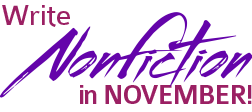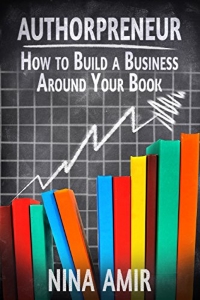 This post is part of the Write Nonfiction in November Challenge (WNFIN), also known as National Nonfiction Writing Month (NaNonFiWriMo), which is brought to you by the Nonfiction Writers’ University — join today for just $1! To find out more or participate in the WNFIN challenge, click here.
This post is part of the Write Nonfiction in November Challenge (WNFIN), also known as National Nonfiction Writing Month (NaNonFiWriMo), which is brought to you by the Nonfiction Writers’ University — join today for just $1! To find out more or participate in the WNFIN challenge, click here.Nonfiction authors have a superb opportunity to make more money from their books. They fill the pages with tips, steps, strategies, and ways to do things. And that information easily is turned into talks, workshops, courses, and webinars as well as coaching and consulting services.
Since the majority of nonfiction author don’t earn a living from book sales alone, learning how to turn one book into many products and services can mean the difference between needing a regular job to pay the bills and creating a livelihood from your words.
There are many ways to monetize a book, so I asked five experts to answer this question:
How can nonfiction writers monetize their books, blogs, articles, and other written work?
Their answers follow after mine.
As the author of the bestselling book Authorpreneur, I’ve written and spoken frequently about the myriad of ways authors can increase the income they make from each book they publish. I’ve also used these strategies to increase my book income. To leverage the content you produced, I suggest the following:
- See each chapter in your book as a potential talk, course, webinar, or service. Write with this end result in mind, and include references to your products and services (or links) within the book.
- Consider the entire book a potential course or curriculum. Each book can, indeed, be turned into something you can teach or an entire program to train those interested in going deeper into the topic.
- Start simple and build. Many writers don’t have strong technology skills. So begin with an easy product based on your book, like lessons delivered by email. Then progress to an audio recording produced using a free teleseminar line. You can get a transcript made of the audio and turn it into an ebook or workbook with MS Word and a simple PDF program. (Even MS Word produces PDFs.) Now you’ve got a nice product that includes an audio and an ebook. Build from there by creating an audio course (four to five audio recordings with transcripts) based on your book. Then try one recorded webinar. (You can add a transcript to it as well, and now you have a video program.) Record three to six more, and you’ve got a home-study course. You can then begin recording with a digital camera, using Keynote or Powerpoint to produce course modules, or start offering live coaching via teleseminar lines or webinar services. Keep in mind that you will need a place to host these courses, like your website, and a way to deliver them to those who purchase.
Stephanie Chandler
- Corporate sponsorships. This is one of my favorite strategies because the income potential is so great. There are many ways you can team up with corporations: sell your books in bulk for their employees or customers, participate in blogging campaigns, conduct educational webinars, speak at their events, and even act as a spokesperson. The key here is to find a company that aligns well with your target audience.
- Content licensing. Along the same lines as corporate sponsorships, you also can license your content to companies. For example, a technology author recently signed a six-figure contract to license just 15% of his blog posts and books to a large corporation to repurpose in their blog, newsletters and white papers. And each time they reprint any of his content, he also receives full credit. Talk about a winning deal!
- Online training programs. Nonfiction authors have a unique opportunity to educate their readers. You can create companion courses to complement your books, and deliver them via one of the many available online training platforms or through your own choice of delivery options (such as private videos posted on your site).
 Stephanie Chandler is the author of several books including The Nonfiction Book Marketing Plan: Online and Offline Promotion Strategies to Build Your Audience and Sell More Books. She is also CEO of the Nonfiction Authors Association, a vibrant educational community for experienced and aspiring writers, and the Nonfiction Writers Conference, an annual event conducted entirely online. A frequent speaker at business events and on the radio, she has been featured in Entrepreneur, BusinessWeek, and Wired magazine. See also: @bizauthor and @NonfictionAssoc on Twitter and Facebook.com/NonfictionAuthorsAssociation.
Stephanie Chandler is the author of several books including The Nonfiction Book Marketing Plan: Online and Offline Promotion Strategies to Build Your Audience and Sell More Books. She is also CEO of the Nonfiction Authors Association, a vibrant educational community for experienced and aspiring writers, and the Nonfiction Writers Conference, an annual event conducted entirely online. A frequent speaker at business events and on the radio, she has been featured in Entrepreneur, BusinessWeek, and Wired magazine. See also: @bizauthor and @NonfictionAssoc on Twitter and Facebook.com/NonfictionAuthorsAssociation.
Website: StephanieChandler.com
Twitter: @bizauthor
Peter Bowerman
The key to monetizing your written work is to create products that people want. Like “duh,” right? Well, given how much UN-useful stuff people try to sell, maybe not…
Have you developed a particular skill set, body of knowledge or useful life experience? If so, others seeking to follow in your footsteps would likely be willing to pay for it.
- From blog to book . Start a blog with the goal of creating content for a book (versus just writing unconnected blog posts). Plot it out in advance, know what you want to say and in what order. Thirty or forty posts later, you’ve got a book. And if you promote the end product throughout the process, you’ll build the buzz all along the way.
When it’s done, you can sell it not only as a book on Subject X, but a way for readers to catch up on all of the posts, including the ones they missed.
Bonus tip—I bundled old ezine issues into e-books (~150 pages) to give away as purchase bonuses when people buy The Well-Fed Writer. I sell those compilations as stand-alone products as well, but they’re far more effective when used as an incentive to buy something else.- Create “companion ebooks.“ When I wrote the first edition of The Well-Fed Self-Publisher, I realized I had a treasure trove of marketing materials I created in the course of marketing, promoting and publicizing my self-published Well-Fed Writer titles—marketing materials that ultimately helped sell 50,000 books.
I originally considered putting it all in the book, but quickly realized this stuff was pretty valuable. I was (at that point) a 20+-year sales and marketing veteran, and here was 101 pages of a self-publisher’s marketing template. So, I packaged it as The Well-Fed SP Biz-in-a-Box (see how I did it here), and sold it for $20. My average sale jumped, but at no additional cost to me (other than the time it took to create it). The strategy was so successful I duplicated it for other books, and with even greater success.- Niche-topic ebooks. As a commercial freelancer, I gathered years of experience partnering with graphic designers, then wrote an e-book about it. Because it was geared towards five-and six-figure freelancers willing to pay for good materials, I was able to charge $40 for it (and periodically offer 25%-off promos).
 Peter Bowerman, veteran commercial writer, is the self-published author of the three award-winning Well-Fed Writer titles on lucrative “commercial” freelancing. He chronicled his self-publishing success (100,000 copies of his books/ebooks in print and a full-time living since 2001) in the 2007 release and its 2014 update (both multiple-award-winners), The Well-Fed Self-Publisher: How to Turn One Book into a Full-Time Living. In 2010, he launched The Title Tailor, his book-titling specialty.
Peter Bowerman, veteran commercial writer, is the self-published author of the three award-winning Well-Fed Writer titles on lucrative “commercial” freelancing. He chronicled his self-publishing success (100,000 copies of his books/ebooks in print and a full-time living since 2001) in the 2007 release and its 2014 update (both multiple-award-winners), The Well-Fed Self-Publisher: How to Turn One Book into a Full-Time Living. In 2010, he launched The Title Tailor, his book-titling specialty.
Websites: WellFedWriter.com and WellFedSP.com
Twitter: @WellFedWriter
Kathleen Gage
A blog is one of the best ways authorpreneurs can build a strong relationship with their readers as well as generate revenues directly from their blogging efforts. All it takes is a bit of planning and consistency with your blogging efforts.
Regardless of how long you’ve been blogging, you can start today to monetize your blog in these three simple ways.
- Try affiliate marketing. Regardless of the industry you’re in, there are likely products and services from other experts and companies you use such as software, training programs, tracking devices, clothing, books and resources.
The process simply requires you sign up as an affiliate for whatever you mention in your blog and then add in your affiliate link where the product or service is mentioned. The easiest affiliate program to participate in is Amazon. With the plethora of products you can promote from Amazon, you’ll never be at a loss of what to write about.- Offer your own information products. If you’ve created an information product you can write about, this is a great way to generate revenues from your blog. Your market and how well this audience knows, trusts and views you as an expert, determines the price point of your offer.
A great way to introduce a low-priced product is with a conversion funnel. For example, I may want to teach my readers about how to sell lots of books. In my blog post, I can invite them to access my FREE report, Hit #1 on Amazon.
When they opt in for the report, they will then be offered a low priced product that is a nice compliment to hitting #1 on Amazon.- Promote your webinars. Rather than simply driving readers to an opt-in page for your webinars, why not write in detail about something you will cover on the webinar? Entice the reader to sign up for the webinar by letting them know you will go further into the topic you wrote about as well as other essential information they will benefit from. Give the link to the landing page for them to register.
When you do your job right on the webinar, the viewers likely will expect some type of an offer. To not make an offer could be doing the viewer, and you, a disservice.
Conversions are higher on a live webinar than simply sending people to a sales page. Once they see the value of your knowledge based on what they learned on the webinar, you are in a better position to offer them a home-study course, a live training or one-on-one coaching.
 Kathleen Gage has a Passion for Thriving. As an award winning speaker, writer and business owner, Kathleen is known as the “no-nonsense, common sense” online marketing strategist, speaker, author, product creation specialist, and owner of Power Up For Profits. She helps experts grow their businesses by being highly visible to their market by writing books, speaking on the platform and committing to a life of playing full out.
Kathleen Gage has a Passion for Thriving. As an award winning speaker, writer and business owner, Kathleen is known as the “no-nonsense, common sense” online marketing strategist, speaker, author, product creation specialist, and owner of Power Up For Profits. She helps experts grow their businesses by being highly visible to their market by writing books, speaking on the platform and committing to a life of playing full out.
Kathleen speaks, writes, consults and teaches about what she believes are the core elements of a successful life: accountability, integrity, honesty, and living with passion and hope.
Website: http://www.kathleengage.com/
Twitter: @KathleenGage
Lee Foster
- Think of China as a future source of income. I now have two books translated into Chinese and selling each month as ebooks. Present to a Chinese publisher why your book might sell in China. For example, one of my books, Travels in an American Imagination, is a series of essays about a citizen’s place in the world. As China emerges, many Chinese are asking that question. It’s fun for me to see my book selling in English and also in Chinese.
- Revenue from ads around your book content on your website may be greater than revenue from the actual sales of books and ebooks. People will endure ads rather than buy the product. Start with Google AdSense Ads. Google is expert at fitting the ad to the content and will pay you 68% of what it earns. My book Northern California Travel: The Best Options sells as a book/ebook but also earns me ad revenue each day as a “website book,” consisting of 30 travel articles on my website at Norcal.
- Make money from your own photos. If you use your photos as illustrations for your blog, website, or books, you could make money selling those photos. To do so, you would need a photo-selling structure, such as mine at http://stockphotos.fostertravel.com. I use this structure to sell a Secure License for my 7,000 digitally-ready photos to other writers for $20 per license. Writers use my photos in their blogs, websites, and books. My main traditional market has been major magazines, such as a photo of a DC jogger on page 65 of the October 2016 issue of Runner’s World. The space and software for my selling structure costs me about $300/year from a vendor known as PhotoShelter, which has about 80,000 photographers using its structures.
 Lee Foster is an author with eight main “living” books among the 18 on his Amazon Author Page. Four are traditionally published and four are independently published, as Lee moves ahead in self-publishing. Lee’s books are in travel, literary, and self-publishing genres. All his writing/photo work can be seen at his Foster Travel Publishing website at www.fostertravel.com. Lee’s latest book, summarizing all his advice and experience on self-publishing, is An Author’s Perspective on Independent Publishing: Why Self-Publishing May Be Your Best Option.
Lee Foster is an author with eight main “living” books among the 18 on his Amazon Author Page. Four are traditionally published and four are independently published, as Lee moves ahead in self-publishing. Lee’s books are in travel, literary, and self-publishing genres. All his writing/photo work can be seen at his Foster Travel Publishing website at www.fostertravel.com. Lee’s latest book, summarizing all his advice and experience on self-publishing, is An Author’s Perspective on Independent Publishing: Why Self-Publishing May Be Your Best Option.
Website: www.fostertravel.com
Twitter: @fostertravel
Shanda Trofe
- My favorite way for nonfiction writers to monetize their books is by turning them into online courses. I did this back in 2013 when I published Write from the Heart, a book that walks the reader through each step of the book-writing process. I simply turned each chapter into a module, and released one module of content per week over an eight-week period, and thus the 8-Week Book Writing Intensive was born. Of course, I had to add additional components to turn my book into a course, such as video tutorials, audios, PDF workbooks, and actionable worksheets. I’ve found, the key to a successful online course is to offer the information in a variety of options to cater to all learning styles.
- For writers looking to monetize their blog, one option is to gather articles around a niche topic and create an ebook. Of course, you wouldn’t want to copy your already published articles word-for-word, but if you have several articles written on a topic, you could easily update those articles and expand upon the information for your ebook. Once you create an outline for your ebook and begin compiling your articles, you’ll often find you have most of the content written and only have to fill in a few key components to complete the book. Nowadays it’s not uncommon to see ebooks that average around 100 pages, sometimes even less, so if you are an avid blogger, chances are you have enough content to compile an ebook on your topic of interest.
- You can link to your blog and other published work from within your ebook. This further drives traffic to your website and grows your list! Score!
 Shanda Trofe is a bestselling author, publisher and author coach. She is the Founder of Spiritual Writers Network, and President & CEO of Transcendent Publishing. Aptly named the Authorpreneur Mentor, Shanda aims to educate aspiring authors not only on the business of writing and publishing but also how to grow an empire based on the core concepts of their published work.
Shanda Trofe is a bestselling author, publisher and author coach. She is the Founder of Spiritual Writers Network, and President & CEO of Transcendent Publishing. Aptly named the Authorpreneur Mentor, Shanda aims to educate aspiring authors not only on the business of writing and publishing but also how to grow an empire based on the core concepts of their published work.
Known for her unique launch strategies, branding, and author platform building, Shanda is always studying the latest tricks of the trade, aiming to position her clients at the top of their niche to create bestselling authors with a variety of tools and products to support their business.
Website: www.authorpreneur.biz
Twitter: @shandatrofe
WNFIN 2016 Resources
Take the Challenge!
To learn more about how to take the WNFIN Challenge and participate in NaNonFiWriMo, click here.
Are you ready to take the challenge? If so, click here.
Hyperlinks to books and resources may contain my affiliate code.









[…] your blog audience is a great way to develop passive income and probably the easiest way to monetize your blog. Affiliate commissions won’t provide a large injection of cash straight away. Done right, though, […]